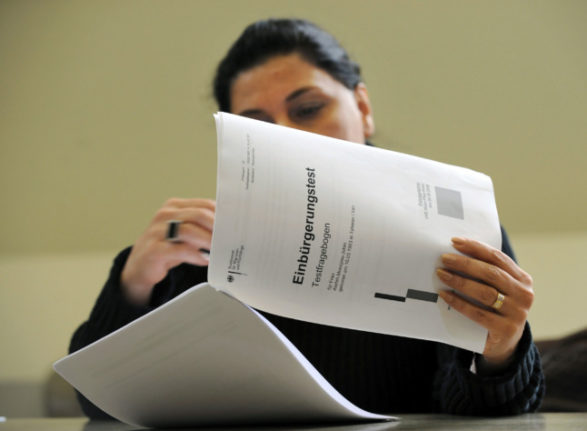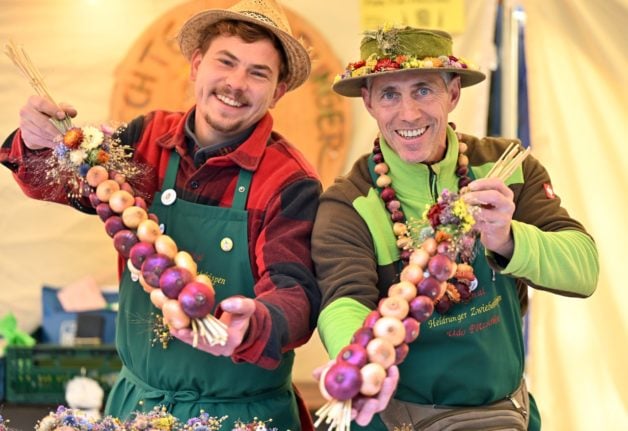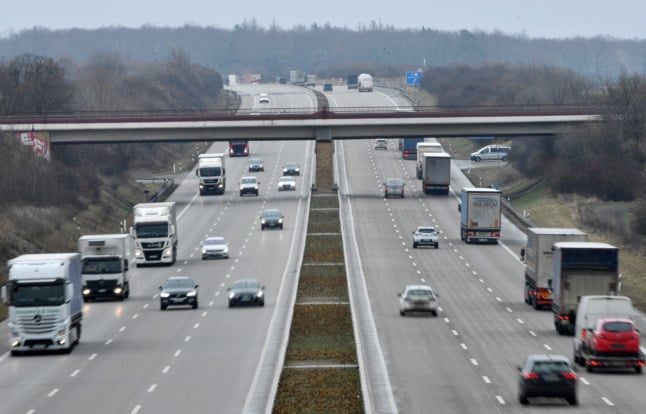Five things that are changing about Germany - and five that never will

Are Germans still living on a strict diet of pork and potatoes? Will they forever be married to their cars? And could we soon hear "Bar oder Karte?" everywhere we go? Here are five things that are changing in German life and culture - and five that seem to be stuck in a time warp.
As internationals living abroad, we often spend time thinking about the ways in which our new homes have changed us. It could be that we've picked up new habits in the food we eat or the way we interact - so much so that we get culture shock when we go back to our home countries.
What's less talked about is how the countries we move to may be changing around us, sometimes as a direct result of the vibrant international communities that live there.
Though Germans have a reputation for being a little bit stuck in their ways, there are number of ways that German society and culture are moving into a new phase. Whether it's the transition to a healthier diet or the increasing use of informal language, many old-fashioned stereotypes about Germany just aren't fit for purpose anymore.
Here are some of the things that are slowly but surely changing in the Bundesrepublik.
Does anybody really say 'Sie' anymore?
Anyone who starts learning German will quickly be confronted with the formal and informal terms for 'you': Sie and du. You may be told that 'du' should be reserved for closer friends and family, or that most people older than you should be referred to as 'Sie' unless they explicitly say otherwise.
While we absolutely agree that it's best to err on the safe side, we'll let you in on a little secret: far fewer people, even in business settings, are regularly using the 'Sie' form these days.
As one journalist wrote in Die Zeit: "Today, the world is no longer so class-based or hierarchical. As a result, we need a polite form of address less and less and resort more often to the informal 'you'."
Combine this with the more international business environment and you'll find that Germans can be far more relaxed than you expect them to be. We still recommend you take your cues from others, but don't be surprised if you end up using 'du' a lot more often than its formal counterpart.
READ ALSO: German word of the day: Duzen/Siezen
Meat-free 'pork' and alcohol-free beer
When you think of German cuisine, you may well envision juicy pork dishes with dumplings and lashings of cabbage, all washed down with a hearty litre or two of beer.
In reality, though, Germans are increasingly turning to healthier options that are a far cry from the stodgy staples we once knew and loved.
According to a report in consumer trends magazine Chip 365, the demand for veggie products is soaring in Germany - and even major meat producers are currently delving into this lucrative market. When Lidl launched its "Beyond Meat" range back in 2019 with its meat-free beetroot burger, it was forced to restock in a matter of days after the products flew off the shelves.
And it's not just vegetarian and vegan food that's taken hold: alcohol-free beer has taken up an ever-larger share of the shelves in most German supermarkets in recent years. Could Jever Fun and vegan Bratwurst be the next hot trend at Oktoberfest?

A delicious vegan meal - the future of German cuisine? Photo: picture alliance/dpa/dpa-tmn | Laura Ludwig
Deutsch is turning into Denglish
Whether it's attending a 'meeting' at work or watching a 'show' once you get home, Germans are increasingly turning to English words to describe their day-to-day lives.
With the prevalence of American movies and British pop music in international culture, English has long been the lingua franca in Europe and elsewhere - but the process of 'Denglification' seems to have been sped up by the Covid crisis. These days it's pretty common for people to work in 'home office' or express their gratitude that these endless 'lockdowns' are finally behind us. Last year, the youth word of the year was also a phrase some British millennials may recognise from their teen years: 'Cringe'.
And it's not just the youngsters who are at it. A recent study found that German MPs were increasingly using Denglish in their Bundestag speeches, talking about things like 'game-changer' legislation or 'out-of-the-box' thinking.
As Germany looks to encourage immigration and even use more English in bureaucratic settings, this is a trend that's here to stay. Which brings us neatly onto our next point...
Society's getting more diverse
Whether it's Syrian refugees becoming the 'new' Germans, a greater number of ethic-minority MPs in the Bundestag or talented young internationals taking up jobs in the country, there's no hiding the fact that German society is changing.
As of December 2021, there were almost 12 million people living in Germany without a German passport - with just over 10 million of these born abroad. Around a quarter of the population has a migration background, meaning they're either first- or second-generation immigrants.
Last year around 1.3 million migrants came to Germany - including more than a million Ukrainian refugees. The government is also pushing through new laws to make the country more attractive to skilled labour from abroad, so, if politicians get their way, Germany will become increasingly diverse in the future.
READ ALSO: How the population of Bavaria is changing due to migration

An applicant for German citizenship fills in her Citizenship Test. Photo: picture-alliance/ dpa | Uli Deck
... and more progressive
Whether it's new laws to support easier gender transitions or majority support for legalising cannabis, Germany seems to be moving in a far more progressive direction at the moment.
That's largely because the liberal-leaning traffic coalition of the Social Democrats (SPD), Greens and Free Democrats (FDP) is currently in power, leaving Angela Merkel's much more conservative CDU and CSU parties on the sidelines.
Of course, not everyone is in favour of some of the sweeping changes being pushed through. However, in recent opinion polls, a majority of the population have come out in favour of things like easing up immigration rules and supporting LGBT rights.
For all the positive changes, Germany does still have a long way to go - especially when it comes to its controversial abortion laws and women's rights in general. And though this isn't changing fast enough, things are hopefully moving in the right direction.
READ ALSO: FACT CHECK: Are Germans more liberal or conservative?
So much for the things that are changing - are there some things that Germans simply refuse to let go of?
We certainly think so. Here are our top five.
Deutsche Bahn's punctuality (or lack of it)
It doesn't take much time for people who move to Germany to discover that they've been lied to their entire life: Germans do not have punctual trains.
While there are certainly countries with worse records, less than two-thirds of long-distance trains arrived at their destinations on time last year - and Deutsche Bahn's tardiness has become something of a national joke.
When The Local spoke to trains expert Jon Worth a while back, he explained that Germany does a lot with the little it has, but that its infrastructure is seriously in need of an upgrade. In other words: you'll still be seeing the German words for "delayed" and "cancelled" for quite a few years to come.
READ ALSO: 'A disaster': How did train travel in Germany get so bad?
Their love of folk festivals
Imagining a Germany without Oktoberfest is like imagining Italy without pizza or Britain without Big Ben: it's nearly impossible. Whether it's the first flush of spring or the middle of autumn, folk festivals are a huge part of Germany's culture and identity - and we wouldn't have it any other way.
From the rowdy, nautical-themed Hafengeburtstag (Harbour Birthday) in Hamburg to the quaint, centuries-old Zwiebelmarkt (Onion Market) in Weimar, these folk festivals are as colourful and diverse as Germany's sixteen states are. But there's still bound to be fairground rides, music, beer gardens and plenty of delicious food on offer wherever you go.

Stall vendors flog their wares at the annual Zwiebelmarkt in Wiemar. Photo: picture alliance/dpa | Martin Schutt
Even in our modern times, the popularity of these historic events doesn't seem to be waning at all, with thousands upon thousands of visitors flocking to them each year. We can't see this changing anytime soon, and we certainly hope it doesn't!
READ ALSO: 10 of the best festivals around Germany in 2023
Digitalisation? What digitalisation?
The year is 2045. You take off your VR headset after a hard day in the virtual office, but alas: there's still admin to do. So you call your robot assistant and ask them what's on your to-do list. "The Landesamt für Einwanderung would like you to fax them some documents," it says.
OK, maybe this is a bit far fetched - but you get the point. Digitalisation is a project that's never anywhere near complete in Germany.
From public officials working with a pen and paper (and - if they're lucky - a scanner) to having to pay with cash even at pricey bars and restaurants, Germany is ultimately a pretty technophobic country. It's an issue that bothers foreigners and locals alike, and it's a cultural issue as much as an administrative one. That's why, whether the year is 2023 or 2045, digitalisation in Germany will always be a project for the future.
The eternal feud between drivers and cyclists
When it comes to modes of transport, Germany is a country with a split personality. On the one hand, it's an outdoorsy place with brilliant cycling infrastructure, but on the other, its car manufacturing industry is a great source of national pride.
This could be why the cars vs cyclists debate is such a fierce one - and it never seems to end. One side claims they rely on their cars and that speeding down the Autobahn is their right as Germans. The other claims they're the eco-friendly option and say they have as much right to the road as their fuel-guzzling counterparts.

The Autobahn near Erfurt. Photo: picture alliance/dpa/dpa-Zentralbild | Martin Schutt
Funnily enough, these two sides are well represented in government right now in the form of the pro-cyclist Greens and the pro-car FDP. And unsurprisingly, this coalition has found itself at a deadlock in recent weeks - particularly on climate issues. For all the talk of the eco revolution, this is one reason we think the Tempolimit debate will be raging for some time. And why the longstanding feud between drivers and cyclists will be a part of German life well into the future.
READ ALSO: Fact check: Is Germany really such a car-obsessed country?
Regional pride - and rivalry
Will there ever come a time when Berliners don't look at you a little bit funny if you say you enjoyed your time in Bavaria? Or when your new friend from Schleswig-Holstein doesn't insist on you trying every kind of pickled-fish-in-bread combination imaginable?
The federal system in Germany is more than just a way of organising government: it's a way of life. Every single one of Germany's sixteen states has its own unique dialects and regional identity, and one of the most exciting parts of moving to Germany is getting to know them all.
So even though we may no longer have borders between the East and the West, there are still countless cultural dividing lines in the country, which lead to a healthy amount of local pride and a healthy amount of regional rivalry too.
That's something we can't see changing anytime soon.
Comments
See Also
As internationals living abroad, we often spend time thinking about the ways in which our new homes have changed us. It could be that we've picked up new habits in the food we eat or the way we interact - so much so that we get culture shock when we go back to our home countries.
What's less talked about is how the countries we move to may be changing around us, sometimes as a direct result of the vibrant international communities that live there.
Though Germans have a reputation for being a little bit stuck in their ways, there are number of ways that German society and culture are moving into a new phase. Whether it's the transition to a healthier diet or the increasing use of informal language, many old-fashioned stereotypes about Germany just aren't fit for purpose anymore.
Here are some of the things that are slowly but surely changing in the Bundesrepublik.
Does anybody really say 'Sie' anymore?
Anyone who starts learning German will quickly be confronted with the formal and informal terms for 'you': Sie and du. You may be told that 'du' should be reserved for closer friends and family, or that most people older than you should be referred to as 'Sie' unless they explicitly say otherwise.
While we absolutely agree that it's best to err on the safe side, we'll let you in on a little secret: far fewer people, even in business settings, are regularly using the 'Sie' form these days.
As one journalist wrote in Die Zeit: "Today, the world is no longer so class-based or hierarchical. As a result, we need a polite form of address less and less and resort more often to the informal 'you'."
Combine this with the more international business environment and you'll find that Germans can be far more relaxed than you expect them to be. We still recommend you take your cues from others, but don't be surprised if you end up using 'du' a lot more often than its formal counterpart.
READ ALSO: German word of the day: Duzen/Siezen
Meat-free 'pork' and alcohol-free beer
When you think of German cuisine, you may well envision juicy pork dishes with dumplings and lashings of cabbage, all washed down with a hearty litre or two of beer.
In reality, though, Germans are increasingly turning to healthier options that are a far cry from the stodgy staples we once knew and loved.
According to a report in consumer trends magazine Chip 365, the demand for veggie products is soaring in Germany - and even major meat producers are currently delving into this lucrative market. When Lidl launched its "Beyond Meat" range back in 2019 with its meat-free beetroot burger, it was forced to restock in a matter of days after the products flew off the shelves.
And it's not just vegetarian and vegan food that's taken hold: alcohol-free beer has taken up an ever-larger share of the shelves in most German supermarkets in recent years. Could Jever Fun and vegan Bratwurst be the next hot trend at Oktoberfest?

Deutsch is turning into Denglish
Whether it's attending a 'meeting' at work or watching a 'show' once you get home, Germans are increasingly turning to English words to describe their day-to-day lives.
With the prevalence of American movies and British pop music in international culture, English has long been the lingua franca in Europe and elsewhere - but the process of 'Denglification' seems to have been sped up by the Covid crisis. These days it's pretty common for people to work in 'home office' or express their gratitude that these endless 'lockdowns' are finally behind us. Last year, the youth word of the year was also a phrase some British millennials may recognise from their teen years: 'Cringe'.
And it's not just the youngsters who are at it. A recent study found that German MPs were increasingly using Denglish in their Bundestag speeches, talking about things like 'game-changer' legislation or 'out-of-the-box' thinking.
As Germany looks to encourage immigration and even use more English in bureaucratic settings, this is a trend that's here to stay. Which brings us neatly onto our next point...
Society's getting more diverse
Whether it's Syrian refugees becoming the 'new' Germans, a greater number of ethic-minority MPs in the Bundestag or talented young internationals taking up jobs in the country, there's no hiding the fact that German society is changing.
As of December 2021, there were almost 12 million people living in Germany without a German passport - with just over 10 million of these born abroad. Around a quarter of the population has a migration background, meaning they're either first- or second-generation immigrants.
Last year around 1.3 million migrants came to Germany - including more than a million Ukrainian refugees. The government is also pushing through new laws to make the country more attractive to skilled labour from abroad, so, if politicians get their way, Germany will become increasingly diverse in the future.
READ ALSO: How the population of Bavaria is changing due to migration

... and more progressive
Whether it's new laws to support easier gender transitions or majority support for legalising cannabis, Germany seems to be moving in a far more progressive direction at the moment.
That's largely because the liberal-leaning traffic coalition of the Social Democrats (SPD), Greens and Free Democrats (FDP) is currently in power, leaving Angela Merkel's much more conservative CDU and CSU parties on the sidelines.
Of course, not everyone is in favour of some of the sweeping changes being pushed through. However, in recent opinion polls, a majority of the population have come out in favour of things like easing up immigration rules and supporting LGBT rights.
For all the positive changes, Germany does still have a long way to go - especially when it comes to its controversial abortion laws and women's rights in general. And though this isn't changing fast enough, things are hopefully moving in the right direction.
READ ALSO: FACT CHECK: Are Germans more liberal or conservative?
So much for the things that are changing - are there some things that Germans simply refuse to let go of?
We certainly think so. Here are our top five.
Deutsche Bahn's punctuality (or lack of it)
It doesn't take much time for people who move to Germany to discover that they've been lied to their entire life: Germans do not have punctual trains.
While there are certainly countries with worse records, less than two-thirds of long-distance trains arrived at their destinations on time last year - and Deutsche Bahn's tardiness has become something of a national joke.
When The Local spoke to trains expert Jon Worth a while back, he explained that Germany does a lot with the little it has, but that its infrastructure is seriously in need of an upgrade. In other words: you'll still be seeing the German words for "delayed" and "cancelled" for quite a few years to come.
READ ALSO: 'A disaster': How did train travel in Germany get so bad?
Their love of folk festivals
Imagining a Germany without Oktoberfest is like imagining Italy without pizza or Britain without Big Ben: it's nearly impossible. Whether it's the first flush of spring or the middle of autumn, folk festivals are a huge part of Germany's culture and identity - and we wouldn't have it any other way.
From the rowdy, nautical-themed Hafengeburtstag (Harbour Birthday) in Hamburg to the quaint, centuries-old Zwiebelmarkt (Onion Market) in Weimar, these folk festivals are as colourful and diverse as Germany's sixteen states are. But there's still bound to be fairground rides, music, beer gardens and plenty of delicious food on offer wherever you go.

Even in our modern times, the popularity of these historic events doesn't seem to be waning at all, with thousands upon thousands of visitors flocking to them each year. We can't see this changing anytime soon, and we certainly hope it doesn't!
READ ALSO: 10 of the best festivals around Germany in 2023
Digitalisation? What digitalisation?
The year is 2045. You take off your VR headset after a hard day in the virtual office, but alas: there's still admin to do. So you call your robot assistant and ask them what's on your to-do list. "The Landesamt für Einwanderung would like you to fax them some documents," it says.
OK, maybe this is a bit far fetched - but you get the point. Digitalisation is a project that's never anywhere near complete in Germany.
From public officials working with a pen and paper (and - if they're lucky - a scanner) to having to pay with cash even at pricey bars and restaurants, Germany is ultimately a pretty technophobic country. It's an issue that bothers foreigners and locals alike, and it's a cultural issue as much as an administrative one. That's why, whether the year is 2023 or 2045, digitalisation in Germany will always be a project for the future.
The eternal feud between drivers and cyclists
When it comes to modes of transport, Germany is a country with a split personality. On the one hand, it's an outdoorsy place with brilliant cycling infrastructure, but on the other, its car manufacturing industry is a great source of national pride.
This could be why the cars vs cyclists debate is such a fierce one - and it never seems to end. One side claims they rely on their cars and that speeding down the Autobahn is their right as Germans. The other claims they're the eco-friendly option and say they have as much right to the road as their fuel-guzzling counterparts.

Funnily enough, these two sides are well represented in government right now in the form of the pro-cyclist Greens and the pro-car FDP. And unsurprisingly, this coalition has found itself at a deadlock in recent weeks - particularly on climate issues. For all the talk of the eco revolution, this is one reason we think the Tempolimit debate will be raging for some time. And why the longstanding feud between drivers and cyclists will be a part of German life well into the future.
READ ALSO: Fact check: Is Germany really such a car-obsessed country?
Regional pride - and rivalry
Will there ever come a time when Berliners don't look at you a little bit funny if you say you enjoyed your time in Bavaria? Or when your new friend from Schleswig-Holstein doesn't insist on you trying every kind of pickled-fish-in-bread combination imaginable?
The federal system in Germany is more than just a way of organising government: it's a way of life. Every single one of Germany's sixteen states has its own unique dialects and regional identity, and one of the most exciting parts of moving to Germany is getting to know them all.
So even though we may no longer have borders between the East and the West, there are still countless cultural dividing lines in the country, which lead to a healthy amount of local pride and a healthy amount of regional rivalry too.
That's something we can't see changing anytime soon.
Join the conversation in our comments section below. Share your own views and experience and if you have a question or suggestion for our journalists then email us at [email protected].
Please keep comments civil, constructive and on topic – and make sure to read our terms of use before getting involved.
Please log in here to leave a comment.